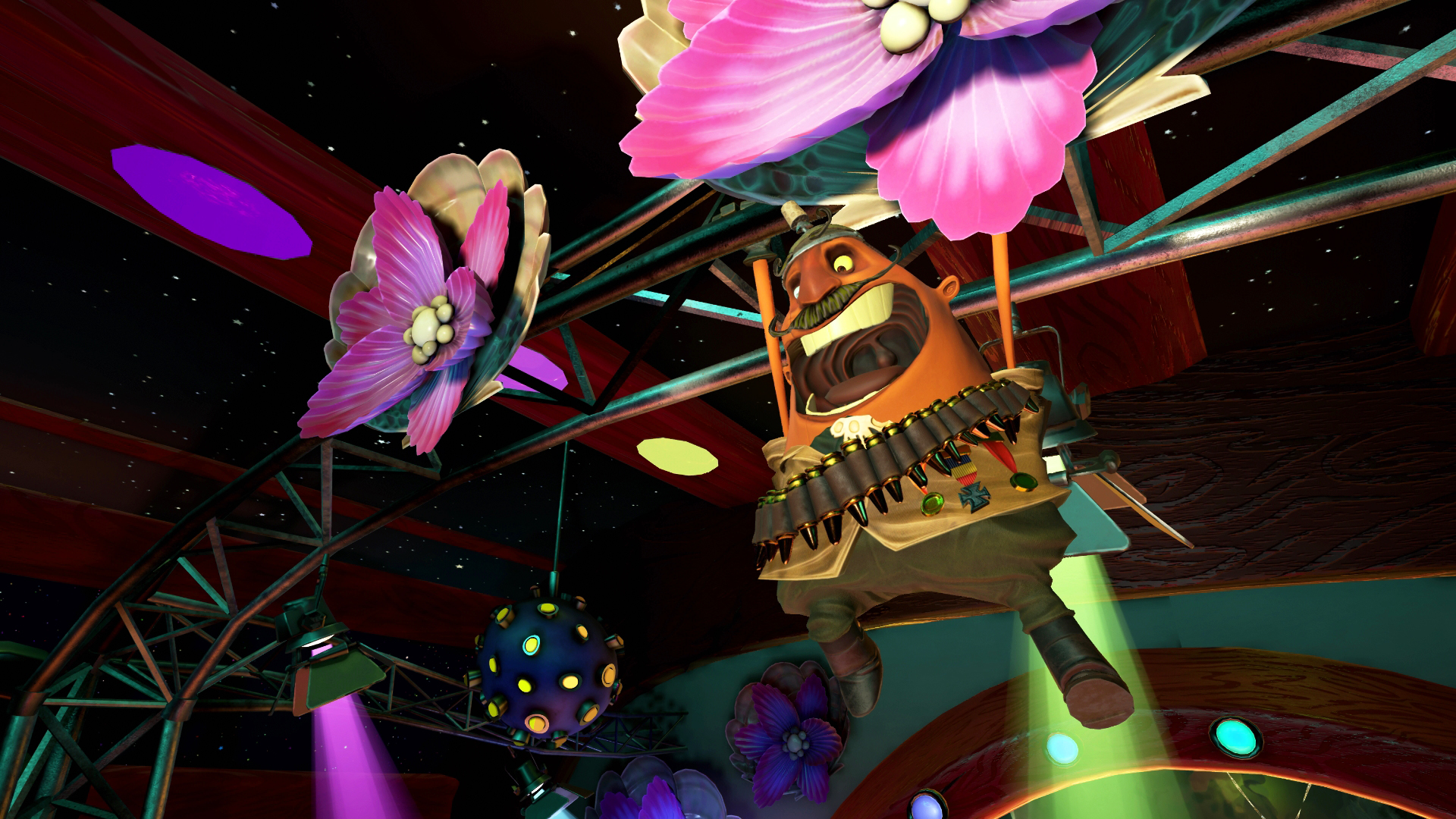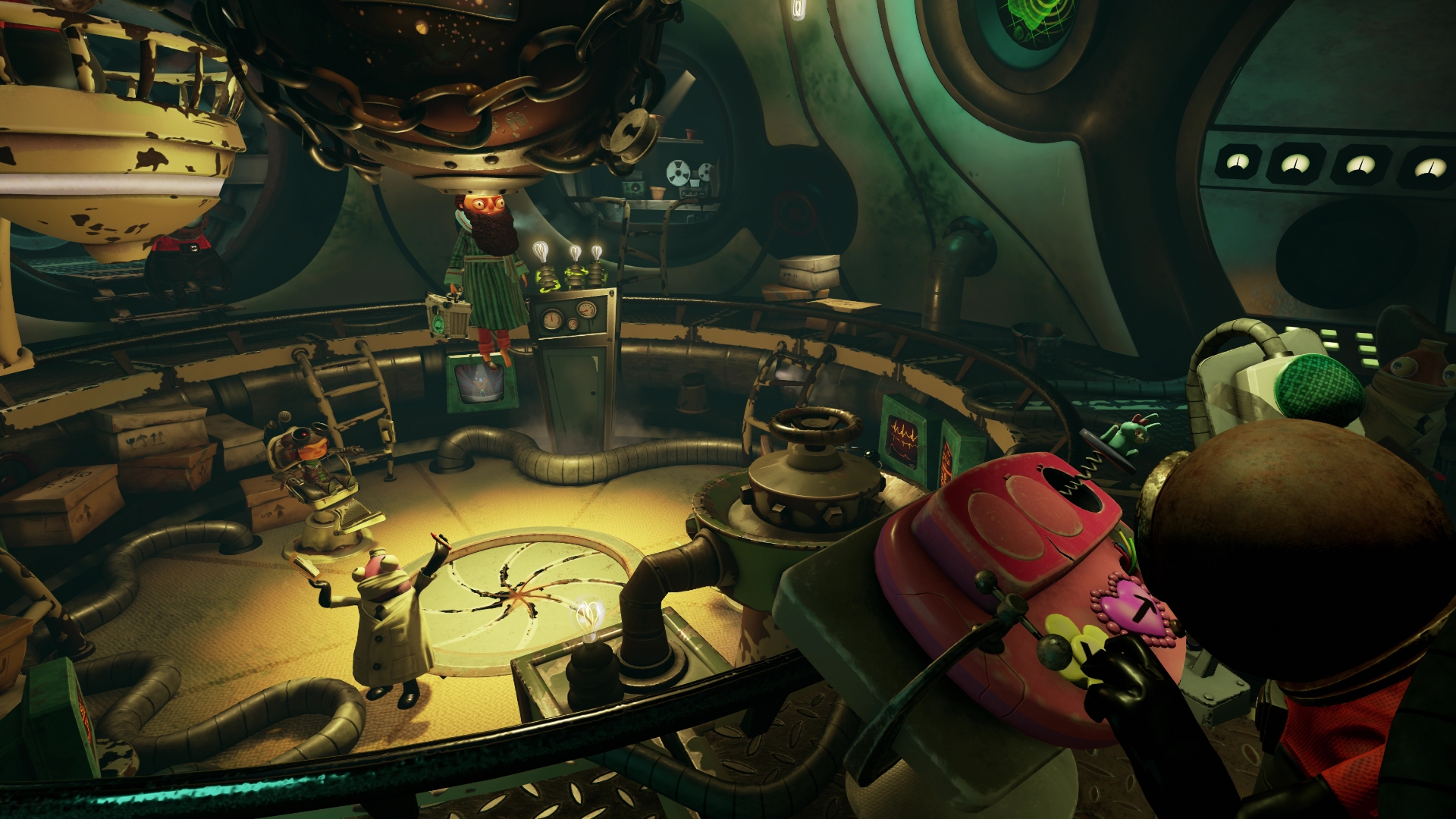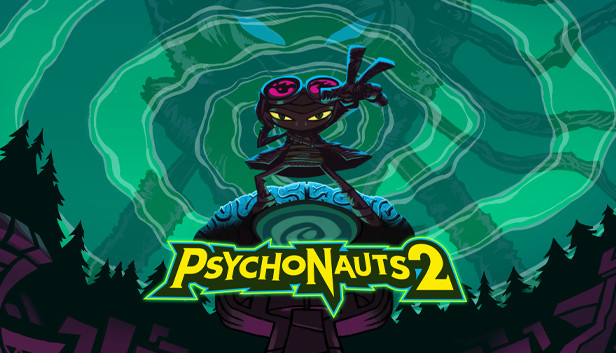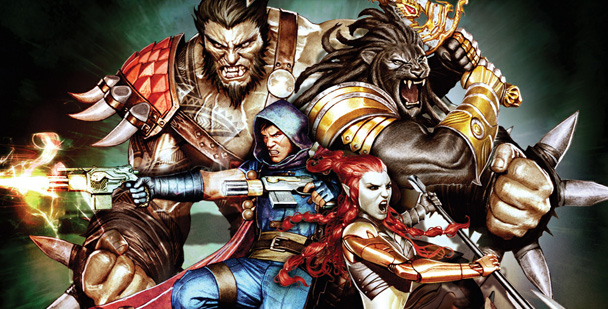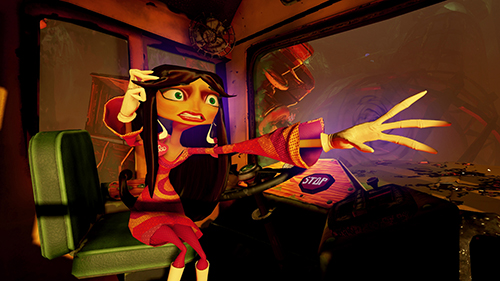
It’s been over a decade since Psychonauts hit the PlayStation 2, and to be honest I thought I’d completely forgotten the psychic world of Raz and friends. I should know better at this point than to doubt the talent of Double Fine and Tim Schafer, as within minutes of slipping on my PlayStation VR headset to play The Rhombus of Ruin, it all came flooding back to me. The original Psychonauts played to Schafer’s best talents, creating endearing and memorable characters in bizarre worlds that parody and heighten aspects of ours. Psychonauts in The Rhombus of Ruin, developed exclusively for the PlayStation VR, does the same, although it feels like a short precursor to the upcoming crowdfunded Psychonauts 2.
The Rhombus of Ruin returns players to the 60’s-esque world of Psychonauts, where children who display psychic abilities are recruited as special agents in the ‘Psychonauts’. Razputin, the hero of the first game and now newly inducted into the agency, is excited to be flying to his first mission to rescue the Psychonauts’ leader, Truman Zanotto, being held in the Bermuda Triangle- I mean, the ‘Rhombus of Ruin’. As you might expect, his plane crashes in the Rhombus as Raz and the rest of the Psychonauts are held captive by strange forces, with Raz the only one who can free them all and rescue Truman.
Off the bat, I have to say that Psychonauts in The Rhombus of Ruin may be one of the best looking games currently on PlayStation VR. The art-style, while having evolved from the PS2-era, is bright and clear enough to make muddiness in the PSVR’s low-resolution screen a non-issue, and everything from character models to text in subtitles looks crisp and clean. It’s also just pleasant to experience, even from the beginning, as The Rhombus of Ruin drives home the spy-era design by immersing you in the intro of a James Bond movie, complete with song.
In order to work in a VR environment, The Rhombus of Ruin plays a lot differently to the original. While you still have access to an array of Raz’s psychic powers, including telekinesis, pyrokinesis and psychic blasts, Raz is unable to move for the entirety of the game. Obviously designed in this way to get around the motion sickness many experience when moving in VR, you instead are able to psychically jump into any living creature around you and view the world from their perspective. All of your traversal, and many of the game’s puzzles are based around this mechanic. At its best, it allows for some creative storytelling – showing what the world looks like to a brainwashed character, for instance. Many times, however, it’s simply a tedious way to get from point A to B as you wait for creatures to line up in a way for you to jump across them to reach your next destination.
As you rescue each member of the Psychonauts crew, including old faces like Sasha Nein, Milla and Coach Oleander, Raz unlocks more of his powers, which are used to varying degrees. Telekinesis (TK) allows you to pick up objects in the environment and manipulate them, pyrokinesis lets you burn stuff and psi blasts let you shoot with concussive force. Most of the game is spent collecting these powers, and by the time you have them all, there’s only a couple of environments left to use them in, which is a little disappointing. The entire game can be completed in one or two sittings, clocking about 2-3 hours depending on how switched on you are to the game’s style of puzzles. At AU $28.95, it’s running at the upper limit of what such a short experience should cost for the PSVR, and doesn’t have the excuse of being a launch title, now that we’re several months into the PlayStation VR’s release.
As I mentioned, the game’s length will depend entirely on how quick on the uptake you are in understanding what you are meant to do to progress. Early in the game’s first few environments, hints are pretty scarce, relying entirely on your ability to look around your environment in VR and take note of details. Later on, Raz may hint at the end objective of a puzzle, but not give any clues on the steps needed to get there. Looking back, I don’t think any of the puzzles were ‘too’ hard, although they can be obtuse. Frequently you’ll have to search behind you, or reposition yourself as you jump from body to body and have to figure out where your new perspective is in relation to the old one. This is also where the tracking can start to wander, at one point I had to quit the game entirely and restart it as it had drifted about 90 degrees from my actual position, despite the main PS4 home screen still working fine. Despite not having an inventory, I’d call the gameplay style Double Fine have devised here a pretty close fit for how a point-and-click adventure game would work in VR. It even has pixel hunting with added neck pain, as your head becomes your cursor, and you crane your neck around to make sure the right object is highlighted.
There’s a lot of heart in Psychonauts, from its characters to the design of the Rhombus of Ruin itself, and especially in the final ‘reveal’, and this gets it a long way in my book. It’s a really nice little prologue to Psychonauts 2, while (mostly) functioning as its own standalone story with mechanics that are tailored to the PlayStation VR. It isn’t pushing any new boundaries with what’s possible with the technology, and it doesn’t provide the most bang for your buck either. However, it escapes that feeling that so many other VR titles create of solely existing as a tech demo, and makes a neat little adventure title, that makes a solid case for further similar games down the line. It’s definitely worth checking out for Psychonauts fans, and PlayStation VR owners in general, when the price lowers a little.
-One of the best looking games made for the PS VR -Translates point-and-click adventure games to VR in its own way -Revives the familiar and bizarre Psychonauts universe successfully
-Short, but with few hints -While endearing, a little overpriced as a prologue for Psychonauts 2 -Occasional tracking issues

